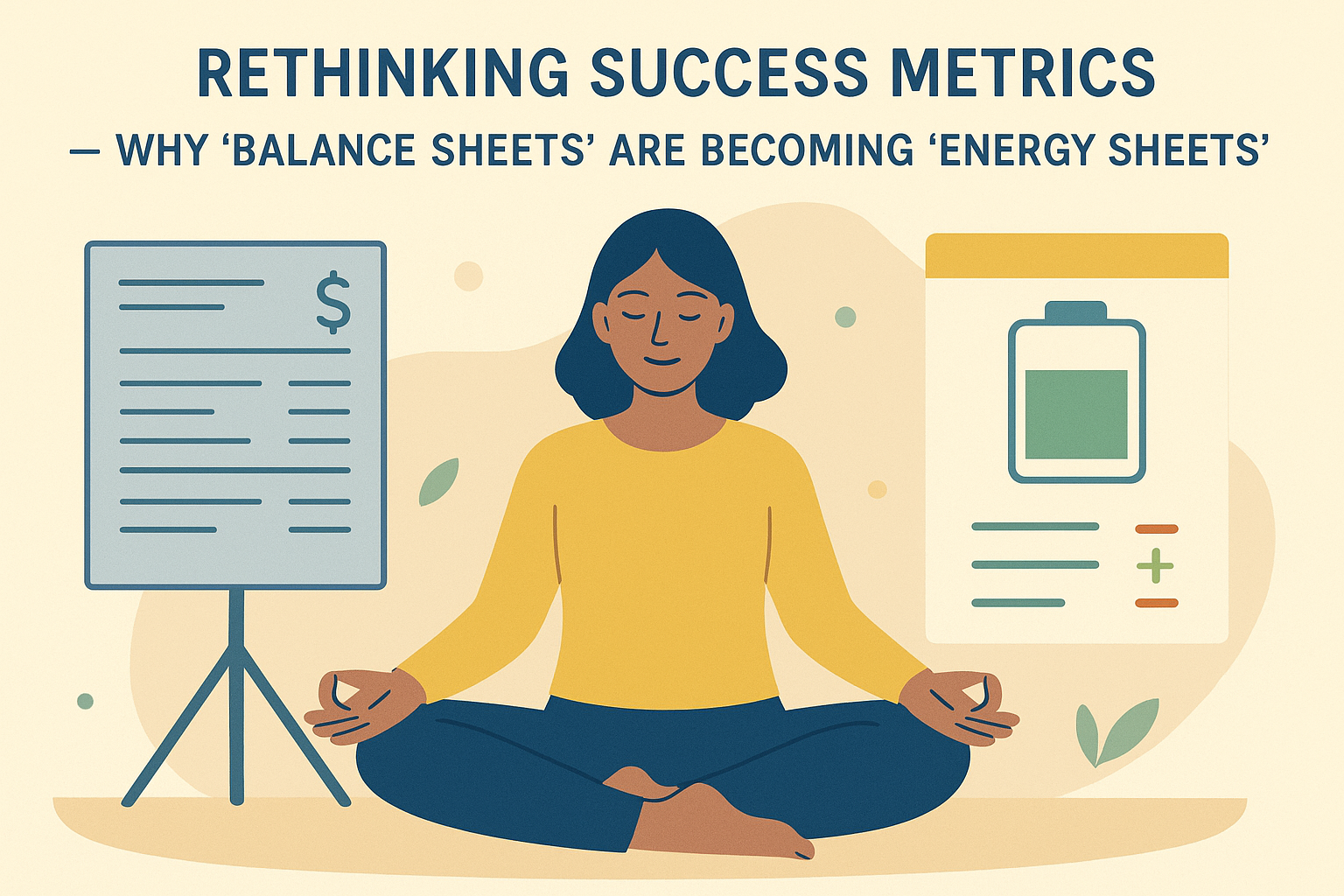Rethinking Success — Why “Balance Sheets” Are Becoming “Energy Sheets”
Introduction
For many years people identified success based on figures — bank account balances, official titles, or the number of items on our to-do list. But recently, there have been rising numbers of people asking a deeper question: What is it costing my energy? The truth is, we are not just running a business or a career; we are also running ourself. "Energy sheets" are becoming the new "balance sheets", where how alive, how rested, and how inspired we feel matters as much as profit or progress. This is a subtle, but impactful shift towards redefining successfulness.

Transforming Gains into Being — Rethinking What We Value
For decades, our society has correlated accomplishment with output — the more you earn, the higher you ascend, the more you, therefore, must be achieving. Recently, however, we have witnessed a quiet interruption of that equation. Many high achievers are becoming aware that growth of an economic nature does not always correspond to personal growth. You can achieve and attain every professional milestone and still feel drained, detached, or creatively empty. The key at present is, in many respects, moving from profit to presence — how much of your life do you inhabit, rather than race through? It’s about paying attention to whether you are adding meaning to your work, or simply adding motion. This reorientation is not anti-ambition; it is pro-alignment. Since when did we arrange things so that focus, peace and authenticity came second to results? When you value these factors as much as results, success becomes sustainable — or at least much more fulfilling.
The Growth of the Energy Sheet — Understanding Where Your Energy Comes from
What if, instead of tracking your expenses and revenue, you tracked your energy? What fills your tank and what drains you? That’s what we mean by energy sheet. An energy sheet is simply a place to reflect personally (on a sheet of paper) on activities, people, and habits that energize you or drain you. Over time you find patterns like having a brainstorming session fills your tank and having back to back meetings drains you. This self-awareness will allow you to design days where you support your rhythms rather than fight them. Some people use colors or simple plus/minus symbols to illustrate energy flow. Progress and improvement are not the goals here — you are looking for information. Once you have an understanding of what truly fills your tank, you can proactively manage your time based on your energy rather than tasks (in a world that is obsessed with productivity it is a subtle but radical shift), and you will realize that this is the true currency of achievement.

Sustainable Ambition — Striving Without Exhaustion
The issue isn’t ambition; it’s burnout. The future of work is more about how to sustain performance without exhausting yourself than it is about pushing harder. Sustainable ambition is about pursuing your inspiring goals without it wearing you down; it’s about when to step on the gas and when to coast. Leaders and teams who are starting to adopt this mindset are seeing better results, not because they’re doing more, but because they’re focused on what actually matters. Flexible work schedules, deep work blocks, and purposeful pauses will soon be viewed as basic necessities instead of niceties or conveniences. The message is straightforward: energy management will always outpace time management. When people feel refreshed both physically and emotionally, creativity comes more naturally, relationships come with greater ease, and goals do not feel heavy. Success takes the form of a rhythm instead of a race.
Creating a Life That Takes Less Than It Gives
Ultimately, a successful life should make you feel invigorated in the end rather than depleted. Creating a life that takes less than it gives means focusing on how you spend your time, the company you keep, and what you agree to. You are building systems that nourish you — rituals in the morning that ground you, work that stretches you but does not deplete you, and relationships that refill instead of drain you. Creating a life that takes less than it gives will not happen overnight, and it will require some fine tuning and honest self-examination. The trick isn’t through strict control, it’s through balance via awareness. Once you begin to sync your choices on a day-to-day basis with your energy, you will be developing a life that feels lighter, more liberated, and truly successful. In this version of success, joy is not something you work towards when you cross a finish line, joy is threaded through the experience of success.
Conclusion
Success today is no longer defined by how much we earn or accumulate; it is about how good we feel while we do it. This shift from balance sheets to energy sheets is an important reminder that the real value of achievement lies in energy not in speed. When we protect our energy, everything else: creativity, meaning, and growth, will naturally come. Perhaps the future of success is not about working harder, but living smarter and feeling alive.
